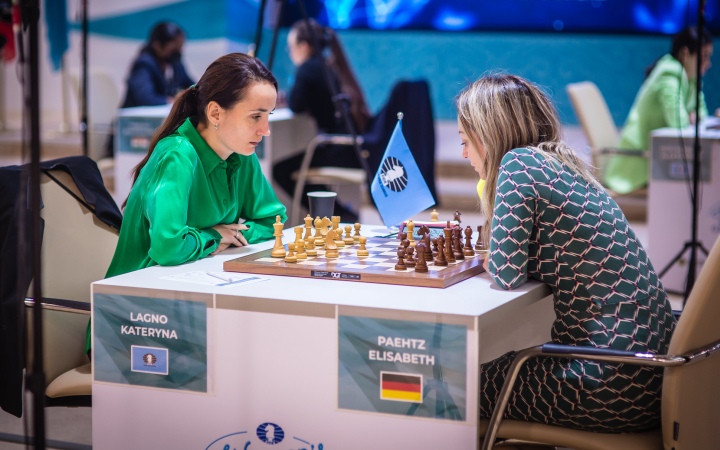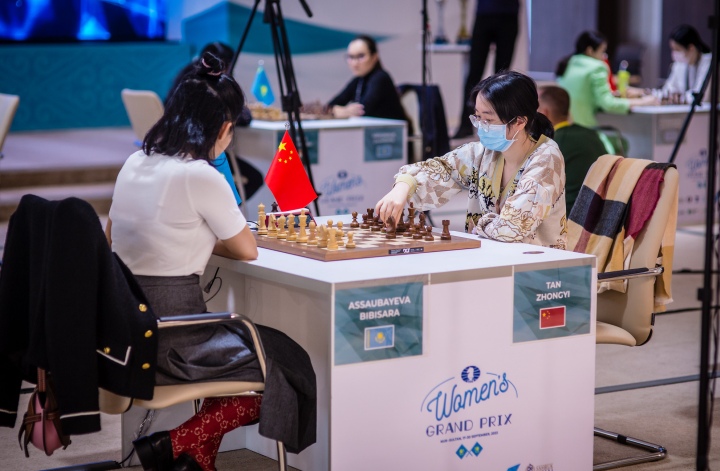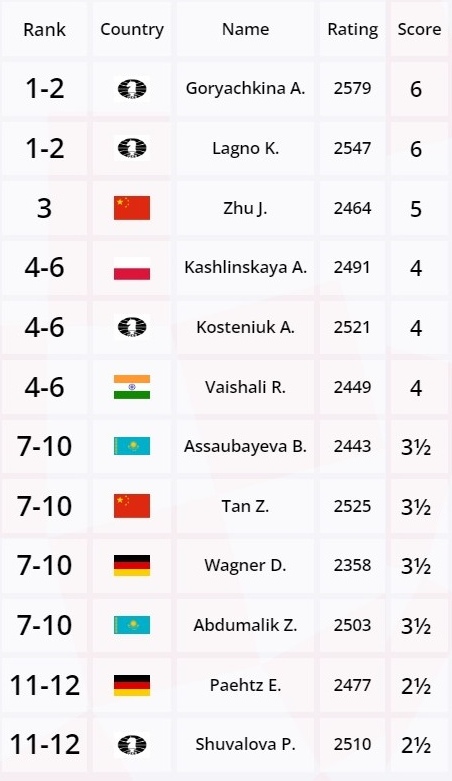Five decisive results in the eighth round of the Women’s Grand Prix
The amount of decisive results in this tournament is staggering. Not a round has gone by without at least two decisive outcomes; most rounds have between three and four, and today, no less than five of the six games finished with a winner.
Compared to most of the top elite events, the drawing percentage is notoriously low, to a large extent based on the fighting spirit of the players: all of them good friends away from the board but fierce competitors when the games begin.
All eyes were on two key games this afternoon. The clash between the two leaders, Aleksandra Goryachkina and Zhu Jiner and the game between Kateryna Lagno (also tied for first) and Elisabeth Paehtz.
Goryachkina, Aleksandra — Zhu, Jiner (1-0)
Undoubtably, the most important game of the round was the clash between the two leaders, who, by the way, had never faced each other over the board before. For this important game, Goryachkina, playing White, chose the English Opening and, more specifically, the Four Knights System, which Magnus Carlsen has recently brought into fashion.
I’m not sure if Goryachkina was expecting this line today, although both players were blitzing out their first moves. A previous 2019 game between Carlsen and Caruana continued with the aggressive 11.0-0-0, but Goryachkina preferred the computer suggestion 11.Be2.

Zhu Jiner went into the tank for 25 minutes, visibly surprised by the turn of events. Nevertheless, she kept her cool and calculated all the best moves, exchanging queens and going into a more or less equal ending. Goryachkina did have a strong passed pawn on d6 but also some weaknesses in her own position.
The Chinese teenager prodigy kept the balance most of the game until she missed 24…Kf8 and then, more importantly erred with 25…Bd7, the losing move (25…Rf8 was still holding). Goryachkina invaded the seventh rank, exchanged a pair of rooks, and after she activated her king, the d6-pawn became the decisive factor. Certain decent endgame technique was required from Aleksandra, but the result was never in doubt.
Goryachkina was kind enough to join us in the press room for a short interview.
Lagno, Kateryna — Paehtz, Elisabeth (1-0)
The first time Lagno and Paehtz faced each other was more than twenty years ago, in the 2001 Girls U18 European Team Championship. Since then, they have played many classical games, with an overwhelming 9-0 record for Kateryna Lagno, albeit with many draws as well in the mix.

Leading the event with 5/7 and with co-leaders Goryachkina and Zhu Jiner playing each other, this game was a golden opportunity for Lagno to make a stand. In a Sicilian Rossolimo, Lagno seemed slightly surprised when she spent 20 minutes for the very well-known exchange 6.Nxd4. On her side, Paehtz took her own 20 minutes to calculate the consequences of 8.Qb3.
Already on the move fifteen, both players were very low in time, which would explain some of inaccurate moves by both of them during the early middlegame stage. Eventually, Lagno won a central pawn and began to consolidate.
Kateryna gradually piled up the pressure with her eyes set on her opponent’s kingside. With a well-timed 44.e6! breakthrough, she won her opponent’s queen and finished off the game effortlessly. In her postgame interview, Kateryna explained to us her opening play.
Assaubayeva, Bibisara — Tan, Zhongyi (0-1)
Standing on 50% in the standings, Bibisara Assaubayeva was eager to take advantage of the white pieces and go for the win against Tan Zhongyi, whose play has proven to be quite unstable in Astana. Although I couldn’t find any previous classical games between them in the database, I did notice a couple of rapid games.

Both players blitzed out the opening, a theoretical line of the Exchange variation of the Queen’s Gambit Declined, in which White also exchanges queen’s on f6, creating a permanent weakness on Black’s kingside in the form of doubled isolated pawns.
However, the theory has more or less proven that Black’s bishop pair offers more than enough compensation, and today’s game didn’t seem to change that assessment. Essentially playing with her increment, Tan Zhongyi improved on a 2018 Kramnik-Aleksandrov game with 16…Rh-g8, with a completely equal position.
At a crucial moment, going for the win, Assaubayeva sacrificed a pawn on the kingside to penetrate with her rook. Observing her games during the last few rounds, it has become apparent that Bibisara is always looking for a challenge and never backs down. She is prepared to take a risk and go with her guts.
However, on this occasion, maybe she burned her bridges. With more time on her clock, Tan Zhongyi prepared a devious rook sacrifice which Bibisara unexpectedly fell for. In her postgame interview, the Chinese representative explained at what point she saw the trap.
Shuvalova, Polina — Kosteniuk, Alexandra (1-0)
According to my database, Shuvalova has dominated Kosteniuk in classical games by a 3-1 margin. In yesterday’s postgame interview, Polina suggested that she would try to leave behind her disastrous start and regroup in the second part of the event.

With White, Shuvalova went for the fashionable London system, grabbing a pawn on the opening and subsequently defending it in exchange for a weakened pawn structure and bishop pair for her opponent. Kosteniuk could have recuperated material with 8…Bxc5 followed by 9…Qa5+, but instead preferred 8…Qf6, which the computer condemns as being clearly worse.
Trying to find some compensation for the pawn, Kosteniuk spent bags of time and around move 20 was already down to her last 25 minutes on the clock: things were looking good for Shuvalova, an extra pawn and much more thinking time.
However, just when Kosteniuk was again very near to equality, Shuvalova went for her last chance to complicate the game – and it worked!
Kosteniuk blundered 26…exf5? (the weird 26…gxf5 was correct, with equality) and after massive exchanges, Shuvalova found herself in a completely won rook ending which she converted with excellent technique.
Visibly happy, Shuvalova joined us in the press centre for a short interview.
Vaishali, Rameshbabu — Abdumalik, Zhansaya (0.5-0.5)
Coming from the same age groups, Vaishali and Abdumalik faced each other for the first time in Maribor, Slovenia, in the U12 Girls World Championship. Vaishali won that game and was proclaimed World Champion.
In that event, Zhansaya Abdumalik came in second, and Polina Shuvalova was ninth. Since then, they have played three more classical games which have always been in Abdumalik’s favour.

Both players thoroughly prepared for the opening – a closed 6.d3 Ruy Lopez. However, something was off for Vaishali, who took 20 minutes for the solid 15.Ne3, which, by the way, had already been successfully played in 2015 by India’s mentor, five-time World Champion Vishy Anand.
Around move 25, the position was balanced. Vaishali’s strong knight on d5 in addition to the control of the c-file, was evened out by Abdumalik’s solid pawn structure and strong bishop.
The Kazakhstani number one women player managed to double her rooks on the seventh rank, with some initiative, but Vaishali’s position was solid enough, and a draw by move repetition was agreed on move 45. The computer suggests that Vaishali still has some advantage and could therefore have played on, but she thought that the position was equal.
Kashlinskaya, Alina — Wagner, Dinara (0-1)
Clearly on very good terms, based on their amicable pre-game chat, both players had reasons to perform strongly today, given their defeats in yesterday’s round. Previously, the scoreboard favoured Poland’s number one Alina Kashlinskaya: 2.5-0.5 in classical games against German’s number two Dinara Wagner.

After blitzing out the first 17 moves, it was apparent that both players had prepared the Nimzo-Indian defence in depth. Queens were exchanged, and the endgame featured two bishops for Kashlinskaya in exchange for Wagner’s superior piece development.
According to the computer, 27.gxf3 was Alina’s main mistake, but the alternative 27.Nxd4 fxg2+ 28.Kxg2 Rxe1 looked tremendously dangerous for White. Soon after, Wagner found a nice combination to win two pieces for a rook.
A technical phase began, in which she tried to consolidate her advantage and maybe promote one of her passed pawns, but eventually, her opponent fell into a mating net, which made things much easier for Black. The happy winner shared her thoughts about the game in a short interview with FIDE Press Officer Michael Rahal.

Round 9 | Astana | 27.09.2022
Tan, Zhongyi — Shuvalova, Polina
Wagner, Dinara — Assaubayeva, Bibisara
Paehtz, Elisabeth — Kashlinskaya, Alina
Zhu, Jiner — Lagno, Kateryna
Abdumalik, Zhansaya — Goryachkina, Aleksandra
Kosteniuk, Alexandra — Vaishali, Rameshbabu
Text and interviews: IM Michael Rahal, FIDE Press Officer, Astana
Photos: Anna Shtourman







